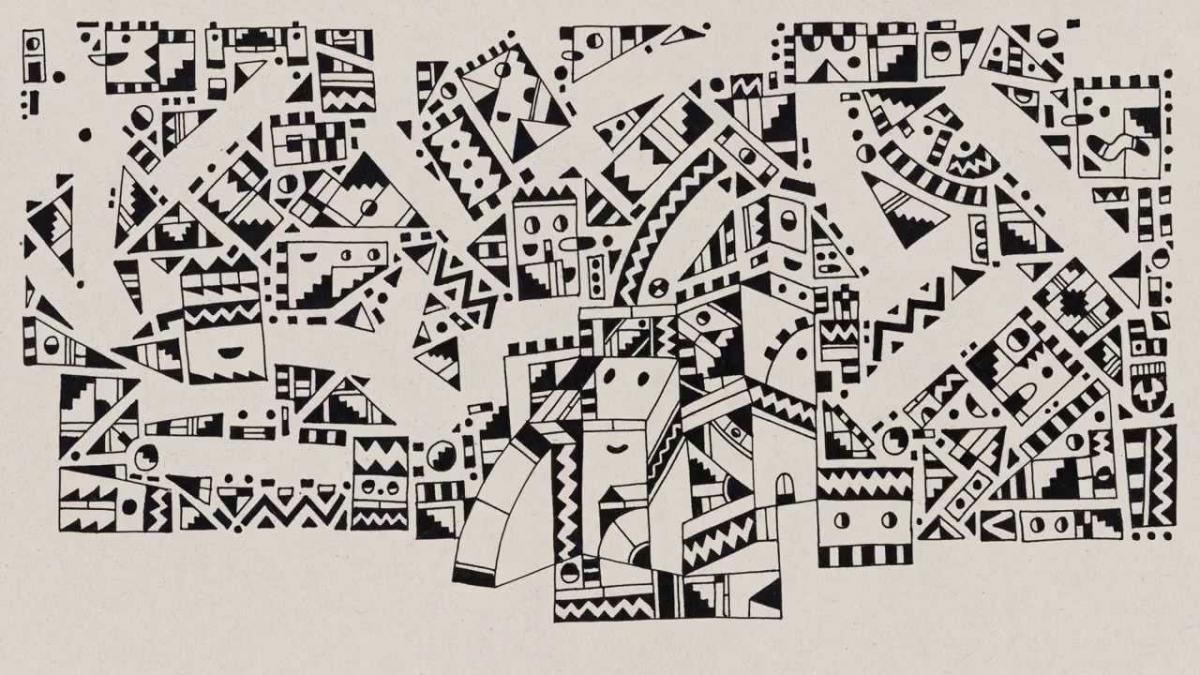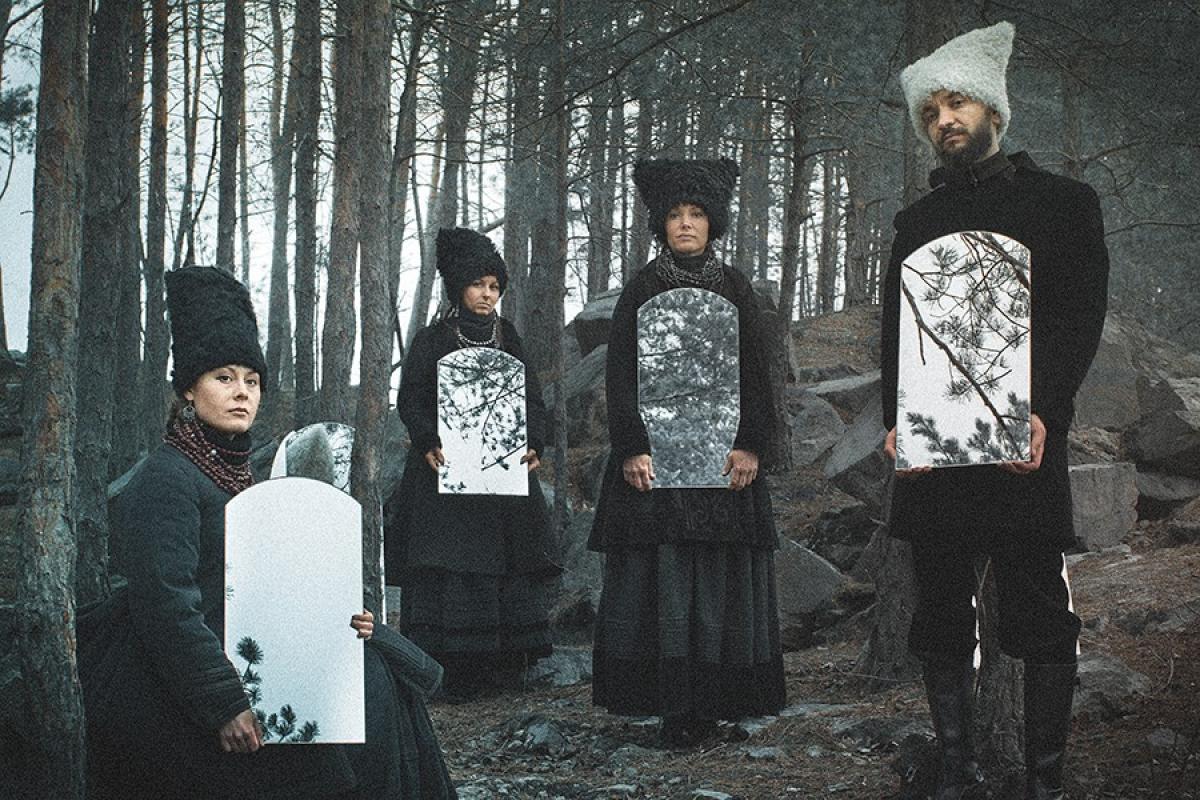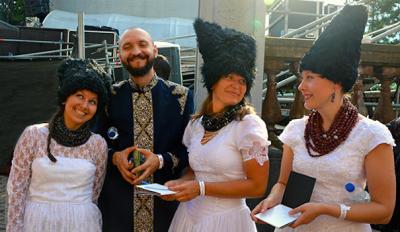
«Producing Music Is a Privilege»
What can the Norient reader find at Off, a three day long feast for lovers of alternative music, that takes place every year in Katowice in Southern Poland? John Wizards and DakhaBrakha, both of who have a bit twisted relations with popular music traditions of the places they’re from. Maybe it’s because they’ve taken them on tour. Read the first festival review about DakhaBrakha with a short introduction by the author here and the second one about John Wizards below.
John Withers is the man behind the concept of John Wizards, a South African hybrid pop epiphany of 2013, whose advocators include Wayne Marshall. John produced the album with a vocalist, Emmanuel Nzaramba, and then translated the music to a six-piece band setup to form a touring act. On the day of their midnight gig at Off the band arrived early. After a long conversation followed by a beer with John, I bumped into Emmanuel on the festival grounds and we talked as we wandered around. While John Wizards is the fusion of John and Emmanuel’s spirits, Emmanuel and John differed on certain aspects of the band’s life. Additionally, Emmanuel’s comments were not recorded, but were written down. I’ll leave my reconstruction thereof as a kind of footnote to the interview with John, just as I took it in.
[Jacek Szczepanek]: First I would like to focus on the word geography. I realised that there’s a lot of internal geography in your music, as well as external geographical labels added on by others. What are your feelings towards geography? And its connections to your music?
[John Withers]: I like to think that music is at least partly regionally specific, that it’s very much a reflection of the city I grew up in and of some of the places I’ve travelled around in Africa. The song titles reference places I’ve been, less stylistically, but more in terms of the type of feeling they gave me when I was there. Then Emmanuel comes from Rwanda and he’s grown up in a completely different tradition speaking an entirely different language and it obviously brings to bear on the music when it’s made. It comes as a hybridised thing.
[JS]: Your music is labelled South African or from Cape Town or from Africa – the big labels people talk about here in Europe. How do you position yourself towards it?
[JW]: That’s a funny thing. When I was making the music, I wasn’t quite so aware of the way things are internationally, geographically – ideas about South Africa, ideas about Africa and its music. When I first came here touring, it was a bit of a shock. There is an interesting disconnect between these ideas and my personal experience, my ideas about the music I’m making.
[JS]: What shocked you? What’s the disconnect like?
[JW]: There is obviously an oversimplification of it. There’s an unfortunate fetishising of it. We’ve had a show in London and they went around interviewing people asking them who they are excited to see at the festival and one of the people said: «I’m really excited to see John Wizards. They are from Africa». It’s a weird thing to feel that you’re novel or you’re interesting just because you are from somewhere different.
[JS]: Do you remember any other things that annoyed you? Other examples of this oversimplification?
[JW]: I think this is disconnected from the music. But you see weird photographic exhibitions which are centred around Africa, Africanness from a European perspective. You see a whole bunch of values that they’re placing onto the subject which for me doesn’t resonate with the reality. As much as I feel that the music does to a certain degree reflect the place I came from, it was always a very natural thing. The way I was writing, that’s just the way it manifested itself. I hope it doesn’t bring to bear too much on future – but I don’t think it will. What is weird is acknowledging of this audience that you’re writing for, of this certain expectation, of the certain criteria which, if you want to be well received, you should try and fulfil. I want to try and step by from it as much as possible.
[JS]: What is the way Cape Town spills into your music?
[JW]: A little bit lyrically – I reference some of the places and some of the scenarios I know very well. Also, if you ask South Africans, there is a stereotype of Cape Town to be very relaxed and laid back and it reflects that a bit as well.
[JS]: You’ve done quite a lot of commercial music. What is the social position of the people who make commercial music in Cape Town?
[JW]: People that write commercial music are often most involved in their own individual creative musical pursuits. You don’t get many people who just focus on writing commercial music – for most it’s just the way of making money. It’s a skill that they have, it’s one of the only feasible ways that you can pay your rent. You’ve got a lot of very cool people doing this thing. Traditionally people think it’s a bit weird, businessy – the pragmatic way of dealing with music. But you have a lot of people doing cool music also doing commercial music. They’re all very nice guys, and young – similar age to me, some even younger. A lot of people who want to do their own thing just end up having to do this other thing to sustain themselves. I feel like you have to come from quite a privileged position (to only do music you like) though – either have a part time job or try and work commercially with music. I feel like you have to come from a proper position of privilege where you don’t really need to worry about money.
[JS]: In your music I was able to trace shangaan electro, kwaito, South African house. What is the general opinion about these genres in Cape Town’s creative community?
[JW]: I think everyone thinks they’re really cool and gets excited about them. A lot of people end up trying to reference these genres in some way. People are quite proud of them. The three styles that you mentioned are popular to varying degrees. Kwaito was very popular in the 90s, late 90s and then it died out a bit and has a bit of a revival at the moment. And then you have shangaan music which is super regionally specific. It’s coming from the North-East of the country and there it’s got a big fan base, but outside of that it’s not the kind of music you’d hear on the radio. Then house music is ubiquitous, it’s really popular on several radio stations. It’s one of the handful very popular styles in South Africa. Because it does feel very South African people are still very proud of it, they still think it’s very interesting. There’s a lot of scope in the genre to do interesting things with it. I am also referencing the music stylistically, but it’s rare that I’ll sit down and say I’m going to write a song in a certain style. There’ll be specific elements of the style that I’m writing that I musically like or that I find interesting. So it is subconsciously filtered into the music.
[JS]: Do you fear sometimes that somebody will tell «you destroyed shangaan electro»?
[JW]: Not really, not at all. It’s funny, there’s this one guy who is the face of shangaan, the guy who really popularised it overseas – Nozinja. I had a funny thing when I met with his manager, who is from the UK. He was in Cape Town and I had a drink with him. And he said he’d played one of the shangaan inspired tracks I’ve written to Nozinja and he showed me a picture of his reaction. Nozinja looked a little bit confused, a little bit pissed off, but it doesn’t really bother me too much.
[JS]: But you haven’t met him yet?
[JW]: No, it’s still to come. Apparently he’s very precious about the style, because he thinks he’s the originator of it, he doesn’t like people imitating it. So it’s going to be interesting.
[JS]: Do people watch out for not exploiting African genres in music?
[JW]: I think it’s something you do need to approach with a certain amount of caution, but it’s also not something that should put you off. If your intentions are good it is a really good thing to be able to work with the traditionalism all around you. It makes you feel grounded in a place, which is I think one of the more valuable things you can have as a musician, to be able to feel as though you’re part of something much bigger than yourself. For me it’s just something I gravitated towards and I didn’t want to think about too much, because when you’re writing you don’t want to have to constrain yourself to worrying about these things. But I think it’s something you do need to be aware of, perhaps after the fact. It’s difficult to say what makes something successful, what makes something a honest reflection on things or exploitative.
[Emmanuel Nzaramba]: There is a parallel to the fates of the two of us: I could not stay at home because of the genocide in 1994 – I became a refugee. Not being able to stay at your home is not good. The whites in South Africa have that, too – they don’t feel at home. Now I want to relocate back to Rwanda. Everything’s gone better there. Many refugees came back with money and education – they can repair things. And, after all, I don’t need a visa to be there.
[JS]: Do you like John’s music?
[EN]: Yes, because it incorporates African elements. And it ought to be like that – John is an African, too.
[JS]: Let me move to your production process. Is there any software or production method that you use for John Wizards and you haven’t used for the commercial music you produce?
[JW]: No, it’s all very much the same. I’m using the same instruments and the same software usually. It’s Ableton – that’s my DAW and I’ll use Kontakt as a sampler and on top of that I’ll program the drums in something like BFD or I’ll sample the drums myself. It’s kind of similar to how I would make a commercial except there’s much more room to do what I want to do or just to let it go on a tangent and see where it goes, whereas when you’re writing for commercials it’s confined.
[JS]: How many live instruments have you recorded for this?
[JW]: My guitar and vocals – that’s it. Everything else is programmed. I’m also very constrained because I recorded the whole thing in my bedroom where the acoustics aren’t great. And I don’t have a great microphone, I’ve got just a Rhode NT1-A and my sound card has just got one input which doesn’t have great converters or a great preamp so it always just would sound better if I was programming.
[JS]: You use Auto-Tune on just one song («Lusaka by Night»). To me, it sounds like something in between James Blake and some North/West-African stuff. What do you think of Auto-Tune?
[JW]: I did use it on two songs, but the second one I tried to make it much more subtle. With the first one I’ve been listening to a lot of West African, Nigerian pop music and their Auto-Tune things are crazy. I didn’t want it to be quite as upfront and as intense as that, but I still wanted it to give a different character to the vocal. I was also constrained because some vocals have been sung in a different key so I wanted to make it sound like there was no possibility of making it sound natural because pitching it up would’ve given it a very weird quality. It was partly accidental, and partly because I was really enjoying this effect of Auto-Tune at the time.
[JS]: How do you get the Nigerian stuff?
[JW]: There’s a channel on TV in South Africa that’s called Base [MTV Base – J.S.] and they play a lot of West African pop music.
[JS]: There is a lot of play between the multiple languages of South Africa. Yet the language that prevails on your album is Kinarwandan. Is it your way to bypass the whole linguistic mess?
[JW]: That wasn’t really a conscious thing. Actually there are three languages – English, Suahili and Kinarwandan. There are a few things. I always wanted Emmanuel to feel most natural when he was singing, and his two first languages are Kinarwandan and Suahili. He lived in Tanzania for a while and he had this friend of his who gave him a lot of advice about music. At the time Emmanuel was really set on singing in English, and this guy said, rather sing in your mother tongue. I encourage him as well to do what felt natural to him and we do a lot of takes – it would never be in English. The other thing was that when I listen to music lyrics have never been the thing that I focussed on. Also I was listening to a lot of music from Central Africa so it felt quite natural to be sung in those languages.
[JS]: How do you feel about the fact that John Wizards are not popular at home, in South Africa?
[JW]: There isn’t a complete disregard for it. There are people who do know about it and it has been recognised in some places and there is a certain amount of popularity, but it’s much bigger in Europe, which is weird. It’s a weird disconnect feel. But I think it has much to do with the fact that we never had a distributor in South Africa, there was not much press initially about it, whereas in Europe there’re all these structures within which the album was promoted and disseminated. It’s funny, to be honest, in a way I kind of like it. It takes pressure off me when I’m there, nothing is different, which is nice as well. It’s not such a big deal because also whenever people have spoken about it or I’ve heard people’s reactions it’s always been really great. I think does resonate with a lot of South African people, just on a much smaller scale.
[JS]: Who are those who do appreciate your music at home?
[JW]: Friends, friends of friends, that kind of thing.
[EN]: It’s cool that we played on some big stages, but it’s John who pushes the idea of touring. We’re here on our second tour, but I still haven’t got decent money out of it. I don’t quite understand it, and besides, how can I show up back home now? How can I get married? My sister has a husband, a nice house and a master’s degree. And me – OK, I’m a musician and I don’t need much, but I do need some foundation. I come from a music family – my father and grandfather played at weddings and parties. Then I played guitar on the streets, and then in Tanzania at hotels and tourist hubs, and people were giving me money. Now with John Wizards I’ve worked for 2 years – I’ve sung, I’ve shouted myself hoarse. I know it takes time to succeed – look at that band [we face Kobiety playing at a distance at the main stage] – their hair is grey already. But I’ve taken that time, I’m 40 now and I wouldn’t want to wait any longer.
Biography
Published on March 03, 2015
Last updated on August 19, 2020
Topics
Why does a Kenyan producer of the instrumental style EDM add vocals to his tracks? This topic is about HOW things are done, not WHAT.
Does one really need the other in order to understand oneself?

